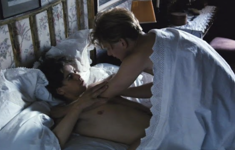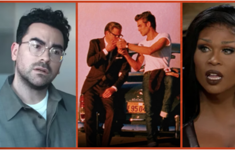Dan Levy on embracing mess, casting Luke Evans as his husband & the movie that always make him cry


In the finale of his beloved family comedy Schitt’s Creek, Dan Levy‘s David gets married and has the happy ending he never knew he always wanted—in more ways than one.
In his feature film debut, Good Grief (his first directorial effort since winning a history-making number of Emmys for Schitt’s Creek) Levy’s character Marc thinks he’s already reached that happy ending: He’s got a high-paying job, a gorgeous London flat, a great group of friends, and he’s got his absolute hunk of a husband, Oliver (played by absolute hunk of an actor Luke Evans).
But when Oliver suddenly and tragically dies, Marc is left a wreck—and that’s before his husband’s secrets come to the surface, revealing their life wasn’t so picture perfect to begin with. Because Dan Levy knows real life is no sitcom, Good Grief is a film that dives head first into the mess of love and loss, and all the complicated emotions that come with being human.
How about we take this to the next level?
Subscribe to our daily newsletter for a refreshing cocktail (or mocktail) of LGBTQ+ entertainment and pop culture, served up with a side of eye-candy.
In other words, we hope you’re stocked up on Kleenex.
With Good Grief now streaming on Netflix, Queerty spoke with Levy about embracing the mess with his first feature, and using the film as a vehicle to explore some of themes he wishes he saw more of at the movies: Found family, the way our relationships evolve as we get older, and queer love in all its forms. The actor-writer-director also opens up about the movies that always make him cry, what it means to tell “LGBTQ+ stories” in 2024, and why he couldn’t resist casting Luke Evans as his husband. (Can you blame him?)
QUEERTY: Hi Dan, thanks so much for being here—congrats of Good Grief!
DAN LEVY: Thank you for having me!
This film is, in part, both textually and sub-textually about how we turn to art—creating it, observing it—to make sense of the big messy feelings in our life like grief. To start, I’m wondering if there’s a movie you love that’s helped you process or understand certain emotions in the past?
You know what, it would probably be Cinema Paradiso! I remember the first time I watched Cinema Paradiso, I was like a heap on the floor—like I did not know that a movie could make me cry as as hard as that movie did. And that’s a movie about loss, funnily enough, and the beauty of relationships and friendships. And, I don’t know, I think I’ve always had such a very deep connection to movies about friendship; I find it always gets me, emotionally speaking.
So that movie was was huge for me. It’s one of those movies where, when I’ve hear someone hasn’t watched it, I’ll sit them down and watch it with them, and just be turning to them, seeing if they’re getting it.
It’s so funny to hear you say that, because I think we all have those movies that we love to revisit time and again, no matter how much they might make us. It’s nice to feel like you have the permission to just, let it all out.
Of course! I will watch that movie probably once every two years. And you know what’s coming, but it’s a beautiful feeling!
And while we’re getting reflective—this is a question I always love to ask other queer folks: Is there a specific movie—or any piece of media, for that matter—that you feel was important in your own journey with and understanding of queerness?
I think Maurice, probably! You know, a young Hugh Grant, and just feelings of love and sadness and betrayal. [Laughs.] It’s all the things that being gay in your 20s is, ultimately, and I guess into your 30s and potentially for the rest of your life! But I thought is was so gorgeous and sad and truthful.
And I think a lot of Andrew Haigh’s movies speak to that experience in really truthful, great ways. I remember the first time I saw Weekend, it was like [mines head exploding.]
Related:
Now, you’ve talked about how writing Good Grief was partially a way for you to process and work through some of what you were feeling in the pandemic, and the loss you experienced. With this hitting Netflix right at the top of the new year, what do you hope audiences might be able to take with them as they face the year ahead, 2024?
I mean, I hope there’s a few things. There’s this idea that, while grief can feel quite isolating, there’s great comfort in knowing that everyone is experiencing a shade of grief in some capacity. So, the comfort of not feeling totally alone in your grief. Then the idea that found family is an important part of our lives that deserve to be front-and-center in a movie, and not just kind of pushed to the sidelines to make way for the romance. I also think there’s a really great conversation to be had about celebrating unmarried, childless people living their lives and being totally happy and content in their 30s, you know?
There’s a lot in there. I think, at the end of the day, I just wanted to write about my life in a way that that was celebratory. Not that I’ve experienced half of what my character has gone through, but elements of my life—all the wonderful things of my life—that that I just hadn’t seen a lot in movies. I hadn’t seen friendship take the spotlight in a movie in a long time.

I’ve heard you describe this movie as—and I’m paraphrasing a bit here—a “reverse rom-com,” where we see what are normally thought of as this “supporting” friend characters take center stage and the romance is secondary. You’ve got talented actors Himesh Patel and Ruth Negga to help bring those characters to life, but can you tell me a bit about writing them? Were you drawing from real people in your life?
Yeah, it’s nobody specific, but elements of everybody. And also elements of friends that I’d love to have in my life. I think there’s something very truthful, particularly in gay friendships, of having very close friends that used to be partners. That’s something that I think is very common, and doesn’t often get discussed—the complexity of realizing that you’re now best friends with someone you used to be with, and the inevitability of one of those people still clinging to the idea that maybe there’s something still left unexplored. That felt really truthful, that’s a dynamic that I’ve been on both sides of.
And then the idea of—you know, I’m 40 now. I started making the movie when I was in my 30s. And there’s this shift that happens in your 30s, where friendships take on a different meaning. Maybe there’s he “life of the party”—in the case of Ruth’s character—in your 20s, they if they’re still the life of the party in their 30s, god bless them. [Laughs.] But, from my experience, some of those people need that rude awakening to realize that they have so much more to offer than just being “fun,” you know? It almost feels like those characters—those friends that we have that are always the center of attention—have subscribed to that idea of who they are as a means of protecting themselves. So it was really meaningful to tell a story of someone who had that awakening and was forced to realize that they are so much more than just a good time.
So, there’s a lot of conversations that I’m having with myself all through my 30s that felt really important to tell here.

And then there’s the gorgeous Luke Evans—even though his screen time is minimal, his presence looms. What made him feel like the right guy for the role? Did it take some convincing considering it’s ultimately a smaller part?
He was sent the script and like immediately wanted to get on a call, and I think there was something in the script that really resonated with him, so he really wanted to be a part of it.
I knew that character needed to be a larger-than-life presence in the first 15 minutes of the movie, it needed to make this huge impact because he’s essentially in every frame of the film beyond that, even though he’s physically not there. So you needed someone that had a tremendous amount of charisma, a tremendous amount of warmth, because we’re taking that character through quite a journey, both good and bad—but a lot of bad. And you just needed his impression within that first little bit of the movie to really last with people so that they could understand the how and the why of who he was. And so they could empathize with him in the end.
And Luke just has this charm—I mean, you know, he’s Gaston for a reason. [Laughs.] And he just has this physical presence. He’s a big man that is a softie and loves people and is completely curious, and fabulous, and joyful, and loves to sing, and take up space—all of these great things that that just lent themselves to this character so perfectly. So, when I met him and we had a conversation about it, I just knew that he was the right person. And he does an amazing job. I mean, it’s a very tough thing to only be in, like, 13 minutes of a movie, and yet be ever-present throughout the remainder of it.
So it was fun to cast him as a love interest, I’m not going to lie. [Laugh.] You know what I mean? Why lie? At the end of the day, why not? Luke Evans wants to play my husband?” Alright, great!
Related:
Oh, of course. And I’m glad you mentioned those opening scenes with him because they’re set during the holidays, it’s so warm and happy, it’s almost like a Norman Rockwell painting. And I can admit I’m seeing Marc and Oliver’s relationship play out and I’m like, “What? Come on! This is too perfect!” Which, of course without giving too much more away, the film does deconstruct a bit…
You needed to put out this very warm and kind of perfect life to not only then juxtapose what happens next, but also to show how Marc—who is running away from a lot in his own life—would find the glamour of Luke’s characters success really appealing and comforting and like a really welcome and pleasant distraction. So it was all kind of set up for a reason. But, yeah, it definitely is a bit of a misdirect.

To talk “bigger picture,” I’m wondering what it means to you to be proudly queer in this industry in 2024. Because surely Good Grief is proof that our stories are being told—and being told by us, no less—but the news cycle can also make this feel like an especially challenging time for our community. What does it mean to you to get to tell this story that is, yes, universal, but also very intentionally and specifically queer?
It means a lot! And it’s not something I ever take for granted.
You know, I get asked a lot about the fact that there’s, like, this active choice that’s been made to normalize the gay relationships in the movie. And it’s not an active choice! I think it is an active choice for a straight filmmaker to tell that story—it’s not an active choice for me. I’m essentially just writing about my life and people I know, and I don’t want to put on white gloves when talking about it. I think the more quote-unquote “normalized” these stories are, the better we are.
I mean, I think in telling the story of David and Patrick on Schitt’s Creek, for example—without ever putting it on a pedestal, or without ever making it seem heavy handed, or like I’m there to teach everyone a lesson—that was what was kind of impactful about it. Because people got to relate to them as people, and not an after-school special that was teaching them the value of gay love. It was two people who happen to be gay, who were falling in love on screen—and people’s affinity for them caught them off guard. That’s what it was.
So, the more we can create space and opportunity for people to speak truthfully about their communities across the board, that’s when we’re going to get the really good storytelling, that’s when we’re going to continue to expand this arena to include stories that represent everybody, that aren’t having to be told with, like, this extra layer of care.
Because, you know, I want to write about the mess! I don’t want to feel like I just have this responsibility to tell a story about gay people that are perfect, or that sets them up to be examples for people. We just want to see ourselves in all the kinds of the good and the bad. It’s about opportunity. And I hope that, in making a movie like this—or something like Andrew Haigh’s new movie [All Of Us Strangers]—you think, “Okay… can can this allow for more?” [Laughs.] Hopefully. That’s the hope. I mean, I’ll be fighting constantly for it.
Oh, absolutely. And we do love mess.
Love mess! It’s part of the culture.
I mean… it is the culture.
It is the culture [Laughs.] Let’s be frank.
Good Grief is now streaming exclusively on Netflix.
Related:







